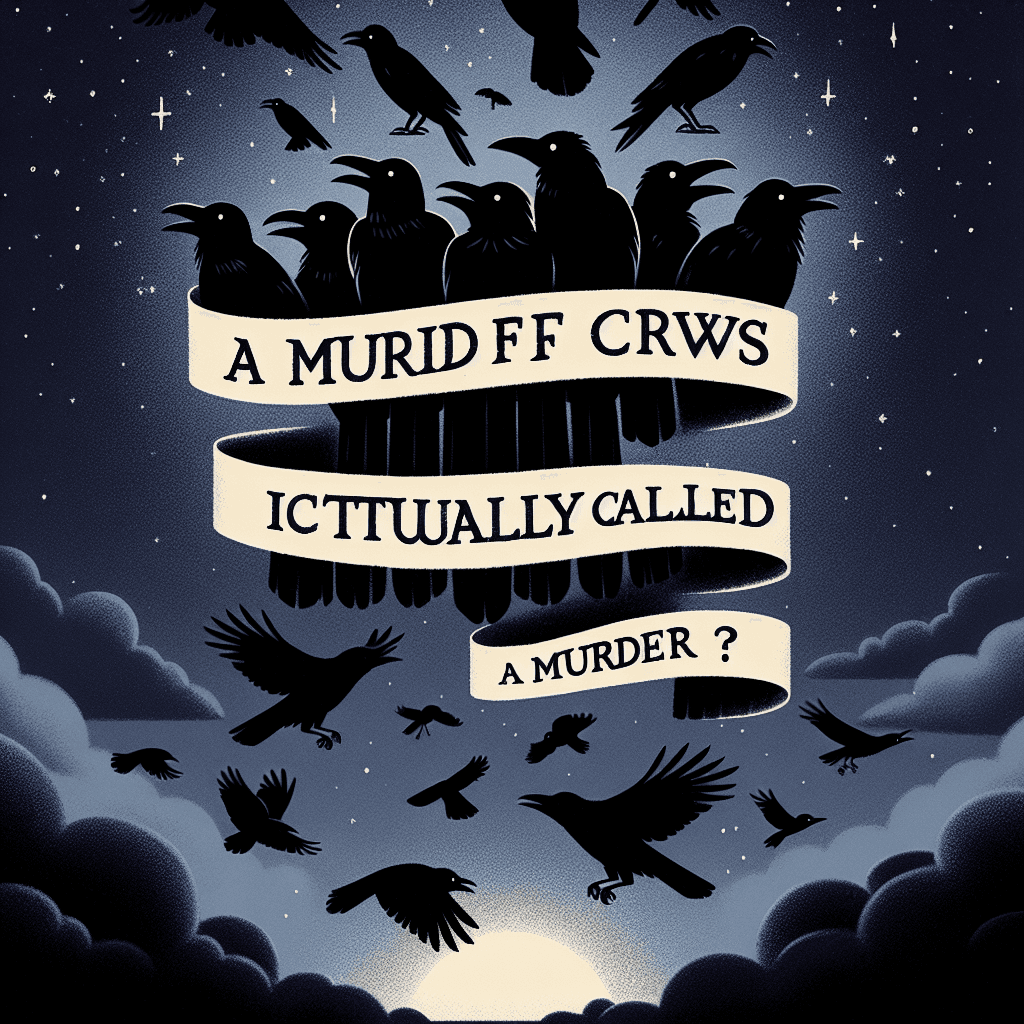Unveiling the Flock: Why is a Group of Crows Actually Called a Murder
The term 'a murder of crows' conjures vivid, macabre imagery. But is there a sinister truth behind this peculiar label, or is it merely a quirk of language?


Too Long; Didn't Read
The name 'a murder of crows' isn't about crows being killers, but likely stems from old folklore and superstitions associating them with death and dark omens.
Unveiling the Flock: Why is a Group of Crows Actually Called a Murder?
Have you ever watched a group of sleek, black crows gather, their intelligent eyes observing, their raucous calls echoing, and wondered about the rather ominous name given to their collective? The term "a murder of crows" certainly conjures vivid, almost macabre imagery. But is there a sinister truth behind this peculiar label, or is it merely a quirk of language? This post will delve into the fascinating origins and theories behind why a group of crows is indeed called a murder, exploring historical contexts and behavioral observations that contribute to this enduring and intriguing designation.
The Roots of the Term: A Dive into "Terms of Venery"
The phrase "a murder of crows" belongs to a category of collective nouns known as "terms of venery." These terms originated in medieval England, specifically around the 15th century, and were associated with the gentry's pursuits, particularly hunting. Publications like the Book of Saint Albans (1486) listed numerous such collective nouns for animals, birds, and even people.
These terms were often:
- Descriptive: Aiming to capture a perceived characteristic or behavior of the group.
- Poetic or Fanciful: Designed to be witty, memorable, or evocative, rather than strictly scientific.
- A Mark of Education: Knowing these terms was a sign of good breeding and knowledge among the upper classes.
So, "murder" wasn't assigned based on ornithological study in the modern sense, but rather through a lens of cultural perception and linguistic playfulness prevalent at the time.
Why "Murder"? Unpacking the Theories
While the precise, singular origin is debated, several compelling theories contribute to why "murder" became the accepted term for a group of crows.
### Folklore, Superstition, and Dark Associations
Historically, crows and their corvid relatives (like ravens) have been steeped in folklore and often associated with dark omens, death, and the macabre.
- Battlefield Scavengers: Crows are intelligent scavengers and were frequently observed on battlefields or near gallows, feeding on the fallen. This grim association naturally linked them to death and slaughter.
- Messengers of Ill Fortune: In many cultures, the appearance of crows was seen as a bad omen, foretelling misfortune or death. Their dark plumage and harsh calls only added to this mystique. Given these strong, culturally ingrained associations, a term like "murder" would have seemed fittingly descriptive of birds so closely linked to scenes of death.
### Observed Crow Behavior
Certain crow behaviors, when interpreted through a human lens, could also have reinforced the "murder" moniker:
- Mobbing Predators: Crows are known to cooperatively attack or harass predators (like hawks or owls) in a behavior called mobbing. This aggressive, united front could be perceived as a violent assault.
- "Funerals" or "Courts": Observers have noted that crows sometimes gather around a dead crow. While scientists now understand this behavior likely involves information gathering (learning about threats), to a less informed observer, it might have appeared as if the crows were holding a "court" to determine the cause of death or even "mourning" in a way that, combined with their other associations, could be twisted into something sinister. Some old tales even suggested crows would gather to kill a crow that had transgressed.
- Loud and Raucous Calls: The loud, often unsettling "caw-caw" of a group of crows can sound clamorous and aggressive, contributing to an overall intimidating impression.
### A Poetic and Evocative Choice
Ultimately, "murder" is a highly evocative and memorable term. In the tradition of terms of venery, which often prioritized cleverness and imagery over literal description, "murder" was likely chosen for its dramatic flair. It captures the somewhat unsettling feeling these intelligent, dark-feathered birds can inspire, playing on existing superstitions and their observable, sometimes fierce, behaviors. It’s more a reflection of human perception and imagination than a statement about the crows' inherent "criminality."
Are Crows Really So Sinister?
Despite their ominous collective noun, crows are far from being simple "murderers." They are among the most intelligent birds in the world, known for:
- Problem-solving skills: They can use tools, solve complex puzzles, and even recognize human faces.
- Strong social bonds: Crows live in complex social groups, often with family units.
- Remarkable memory: They can remember individuals (both crow and human) and places associated with good or bad experiences.
The term "murder" is a fascinating linguistic relic, born from a blend of folklore, observation, and the poetic license of a bygone era. It highlights how human culture and perception shape the language we use to describe the natural world.
Conclusion: A Name Etched in History and Imagination
The designation "a murder of crows" is less about the birds' actual propensity for violence and more about centuries of human folklore, observation of their scavenging nature, and the linguistic creativity of the 15th century. These intelligent and social birds, often associated with death and dark omens in historical contexts, earned a collective noun that is both striking and somewhat misleading. While the term is undeniably evocative, it's important to remember it reflects our historical perceptions and poetic traditions rather than a scientific assessment of crow behavior. So, the next time you see a group of crows, you can appreciate both their remarkable intelligence and the intriguing, centuries-old story behind their collective name.


